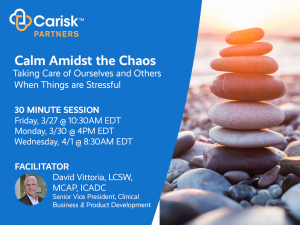Workers’ comp is singularly ill-equipped to handle COVID-19…but some organizations are making solid progress
The industry’s antipathy towards change, resistance to anything smacking of risk, and rejection of most anything remotely “innovative” ensures many payers, vendors, regulators and other stakeholders won’t be able to handle the fallout from COVID-19. Industry veterans know that any change is brutally hard, slow, and fulls of fits and starts; if there’s a business that struggles mightily to innovate its workers’ comp.
Few WC organizations will adapt quickly enough to keep pace. Executives get promoted for not making mistakes, for squeezing vendors, for cutting administrative expenses – not for innovating, taking risks, being creative. These “attributes” are exactly what organizations don’t need if they are to survive the next few months. Example – many payers are viewing COVID-19 thru the lens of yesteryear, acting as if the future will be the same as the past.
It won’t be.
Covid-19 will change workers’ comp in ways that would have been incomprehensible just a week ago.
But some are moving quickly.
Two big insurers are suspending premium collection – a huge shout out to Chesapeake and BWC Ohio for leading the way. Kudos to the State Fund of California for suspending policy cancellations and penalties for late payments.
Others may follow…for good reason. Workers’ comp insurance has been very profitable of late and most insurers can afford to tap into cash reserves.
Tele-everything is exploding, albeit haphazardly. Regulators in many states are scrambling to enable/allow/legalize the use of telemedicine in its many forms. Vendors are struggling mightily to keep up with the patchwork of state-specific regulations which are different today than they were yesterday. Payers that pooh-poohed the very idea of telemedicine, or slow-walked it, or had programs in name only are beating down vendors’ doors, demanding access to a service they gave short shrift to just a week ago.
Inevitably, mistakes will be made – what was OK yesterday isn’t going to be tomorrow, and program requirements, procedures, approval processes, and forms are all in a state of flux. This is where the IAIABC could be hugely helpful; The IA is uniquely positioned to bring regulators together to agree on a standard set of guidelines and regulations that should be adopted by each state. These should be fast-tracked because telemedicine will be critical to ensuring injured workers get the care they need.
Regulators and industry executives that ponder, debate, discuss, and dither will do harm to patients, providers, and policyholders alike. Of course there will be things they won’t like or that “won’t fit” – but now is not the time to argue, it is the time for action.
This does NOT mean employers and insurers shouldn’t embrace telemedicine and telerehab, just make sure you are working with vendors experienced in the space. Concentra is one, MedRisk (HSA consulting client) is another. Carisk (also HSA consulting client) is able to deliver services to their cat/complex patients via their proprietary application. The company is also providing access to behavioral health services via telepsych.
For those in the Independent Medical Exam space, you may be able to ply your trade remotely. Register for Chris Brigham’s webinar Working in the Virtual World – Practical Steps for the MedicoLegal Expert here. It’s tomorrow, Wednesday March 25 at 3 pm eastern.

And for those of us in need of a refresher in coping skills – which includes pretty much all of us – register for David Vittoria’s terrific (and free) half-hour webinar Calm Amidst the Chaos: Taking Care of Ourselves & Others When Things are Stressful. Sign up here.



Joe, You may not realize it but almost every state department of insurance has issued prohibitions on cancellations/penalties for non-payment of premiums for a period of at least 60 days. This applies to all carriers and all lines of coverage.
Also, those cash reserves you keep referencing…..those are surpluses that are required by statute for situations just like this. Watch what happens to WC industry combined ratios for 2020. Decline in premiums, decline in investment income, increase in claims costs. According to III, the workers’ compensation line is the highest at risk insurance P&C line with this pandemic.
Hello Mark – always good to hear from you; hope you and yours are well.
Thanks for pointing out the regulatory actions; those are excellent first steps. Unfortunately, there is little coordination on issues such as telemedicine, making it very difficult for employers, payers, and vendors alike to deliver the medical services patients desperately need these days wihtout customizing everything for each state. That is making it harder for patients to access care.
Re the reserves, I’ve noted many times of late insurers are sitting on “excess” reserves; that is, reserve balances that are well in excess of statutory requirements. California’s State Fund, BWC Ohio, the Workers’ Compensation Trust of CT, commercial insurers…all are returning excesses in the form of dividends or profits. Conning wrote on this about two years ago – and things have improved since then (source –
https://www.conning.com/about-us/news/pc-industry-loss-reserve-press-release )
NCCI reported excess reserves in the $5 billion range for 2018; if anything that position has improved.
https://www.ncci.com/SecureDocuments/SOLGuide2019.html
I wasn’t able to locate the III report or study – can you post a link?
Re investment income, I’d suggest as most reserves are in bonds and other very conservative debt instruments, investment returns likely improved as interest rates have dropped dramatically over the last few weeks.
http://go.conning.com/Workers-Compensation-Analysis-AM-WEBC.html
Net is all of us – including workers’ comp insurers – are going to have to step up. The world has changed, as much as we don’t like it.